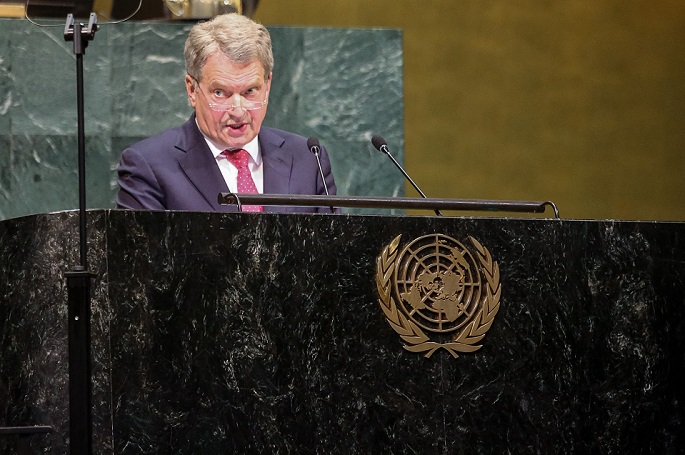Niinistö asks UNGA to promote rights, climate
Published : 26 Sep 2018, 01:53
Updated : 26 Sep 2018, 11:00
President Sauli Niinistö in his address to the United Nations General Assembly on Tuesday emphasised on development, human rights and sustainability, while also focusing on climate change and its mitigation, to ensure man’s peace and security.
“The most important achievements of the UN system in recent years are testimony to this. I am thinking of the Agenda 2030, the Paris Agreement, and the Global Compacts on Migration and Refugees. Issues like sustainability, climate change and migration are not only about development and human rights. They are also essential questions of peace and security,” Niinistö was quoted as telling the UNGA by a statement issued by his office.
In his speech, the president also expressed Finland’s support to the UN multilateralism reform agenda.
He said, so far, the voluntary contributions from the state parties to the Paris Agreement are not enough to keep the global temperature rise well below two degrees Celsius. “We must do a lot more, and more quickly.”
The Finnish presedent pointed out that, unfortunately, there is now reason to be worried for all of us who believe in the benefits of multilateralism. The international system we have built together is under pressure. Its capability and credibility are questioned. We can no longer take the rules-based order for granted. It is our common responsibility to actively defend and develop it.
“We fully support the Secretary-General’s ambitious and comprehensive reform agenda. Now is the time to implement these reforms. We must ensure that the UN of the future is more transparent, accountable and efficient,” he quipped.
Niinistö pointed out that the three pillars of the UN – peace and security, human rights and development – have stood the test of time. “But we have also discovered that many of the present global challenges do not respect the boundaries between them. The pillars are increasingly interlinked, as are the challenges themselves.”
He also mentioned that the Arctic region is warming at an alarming pace, which is not just a regional problem in North, as it poses a threat to the entire global climate system.
“One important factor in accelerating the melting of sea ice in the Arctic is black carbon emissions. Reducing black carbon that lands on the white ice would have immediate positive effects to prevent melting,” mentioned the president, adding that “A commitment to curb those emissions would be a key objective of an Arctic Summit that Finland, as the current chair of the Arctic Council, is ready to host.”
Niinistö also explained that without mitigation, climate change will also lead to a further increase in migration flows. “Already now, some 65 million people across the world are displaced – the highest figure since the Second World War. Some hundred million people worldwide are in urgent need of basic humanitarian assistance, and the number is growing. There are no quick and easy solutions, but doing nothing is not an option.”
In this respect, he welcomed the Global Compact on Migration and said he was looking forward to participating in the conference to adopt it in Marrakech in December.
In his clear and comprehensive policy speech, the Finnish president said. “Full-scale wars, conflicts of varying intensity, and breaches of international law continue to haunt us. They constantly remind us of the immense human suffering involved. We, the international community, need to remain persistent in our efforts to solve ongoing conflicts, regardless of how deep-rooted and long-lasting they may be.”
He said while existing conflicts need to be solved, our priority must be preventing future ones. Finland welcomes the efforts to strengthen the UN’s conflict prevention capacity.
He also reiterated that Finland appeals to all UN member states and the secretary-general to consistently keep human rights, non-discrimination and gender equality on top of the agenda of the UN.
The president concluded his speech remembering the late UN Secretary-General Kofi Annan, saying, “More than ever before in human history, we share a common destiny. We can master it only if we face it together. And that, my friends, is why we have the United Nations.”


